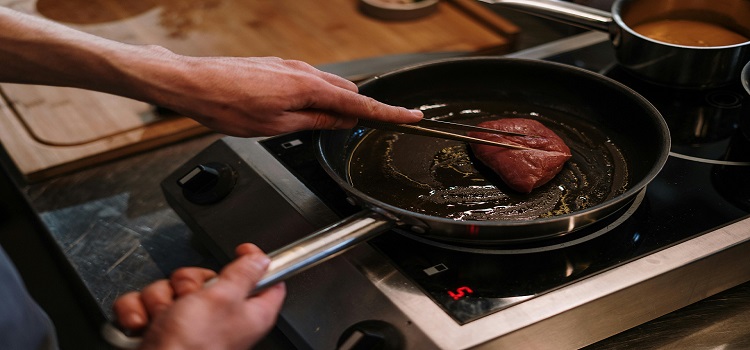As an Amazon Associate I earn from qualifying purchases.
Does an Induction Cooker Cause Cancer?
Induction cookers have become increasingly popular due to their efficiency, safety, and modern appeal. However, concerns about whether they might pose health risks, particularly in terms of cancer, have led to many questions and debates. This article will explore the science behind induction cookers, the potential health risks, and whether there’s any credible evidence linking induction cooking to cancer.

What Is an Induction Cooker?
An induction cooker uses electromagnetic fields to generate heat directly in the cookware, unlike traditional gas or electric stoves, which heat the burner or coil and then transfer that heat to the pot or pan. This method is not only faster and more energy-efficient but also allows for precise temperature control.
How Does Induction Cooking Work?
Induction cookers generate an electromagnetic field just below the ceramic surface of the cooktop. When a magnetic cookware (like cast iron or stainless steel) is placed on the cooktop, the electromagnetic field induces a current within the cookware, which then generates heat. This process is incredibly efficient because the heat is produced directly in the pot or pan, not in the cooktop itself.
Exploring the Cancer Concerns
The concern that induction cookers might cause cancer arises from the fact that they produce electromagnetic fields (EMFs). EMFs are areas of energy that surround electrical devices, and some people worry that long-term exposure to these fields might increase the risk of cancer.
However, it’s important to distinguish between different types of EMFs. The electromagnetic fields produced by induction cookers are non-ionizing, meaning they do not have enough energy to remove tightly bound electrons from atoms or molecules. This is in contrast to ionizing radiation, like X-rays, which has been proven to increase cancer risk.
Scientific Perspective on Induction Cooking and Cancer
Numerous studies have been conducted on the potential health effects of EMFs, especially those generated by household appliances like induction cookers. Here’s what the research says:
- Low-Level EMFs: The EMFs emitted by induction cookers are considered low-frequency and non-ionizing, which are generally not strong enough to damage DNA or cells directly.
- Current Evidence: As of now, there is no conclusive evidence to suggest that exposure to the low-level EMFs produced by induction cookers increases the risk of cancer. The World Health Organization (WHO) and other health agencies continue to monitor the situation, but current data does not support the claim that induction cookers cause cancer.
- Safety Standards: Induction cookers are subject to strict safety standards that limit the amount of EMF exposure, ensuring that they are safe for everyday use.
FAQs About Induction Cookers and Health
- What are EMFs, and are they dangerous?
- EMFs (electromagnetic fields) are areas of energy produced by electrical devices. The EMFs from induction cookers are non-ionizing and considered low-risk by health authorities.
- Can induction cookers cause cancer?
- There is no conclusive evidence linking induction cookers to cancer. The EMFs they emit are low-frequency and non-ionizing, meaning they do not have the energy to cause cellular damage.
- How do induction cookers compare to other cooking methods in terms of safety?
- Induction cookers are generally considered safe. They are more energy-efficient and safer than gas stoves because they don’t produce open flames or harmful fumes.
- Do I need special cookware for induction cooking?
- Yes, induction cookers require magnetic cookware, such as cast iron or certain stainless steel. If a magnet sticks to the bottom of the cookware, it should work with an induction cooktop.
- Are there any long-term health risks associated with using an induction cooker?
- Current research does not indicate any significant long-term health risks from using an induction cooker. The EMFs they produce are minimal and regulated to be safe.
- Can pregnant women use induction cookers safely?
- Yes, pregnant women can safely use induction cookers. The EMFs are low and non-ionizing, posing no significant risk to the mother or the unborn child.
- Are there any precautions I should take when using an induction cooker?
- While induction cookers are safe, it’s advisable to maintain a slight distance from the cooktop while it’s in operation to minimize EMF exposure, as with any electrical appliance.
- Do induction cookers emit radiation?
- Induction cookers emit low-frequency electromagnetic radiation, which is non-ionizing and generally considered safe. It’s different from the harmful ionizing radiation emitted by devices like X-rays.
- Why do some people worry about the health effects of induction cookers?
- Concerns stem from the fact that induction cookers produce electromagnetic fields. However, the type of EMF they emit is non-ionizing and not associated with cancer risk based on current research.
- How can I minimize any potential risks when using an induction cooker?
- To minimize potential risks, ensure proper ventilation in your kitchen, use the correct cookware, and follow the manufacturer’s guidelines. Standing a small distance away from the cooktop during use can also reduce EMF exposure.
Conclusion
Induction cookers offer a safe, efficient, and modern way to cook. While the idea that they might cause cancer can be concerning, current scientific evidence does not support this claim. The electromagnetic fields produced by induction cookers are low-frequency and non-ionizing, meaning they are not strong enough to cause harm. For those interested in a quick, clean, and energy-efficient cooking method, induction cookers remain a reliable choice.
As an Amazon Associate I earn from qualifying purchases.
Leave a Reply